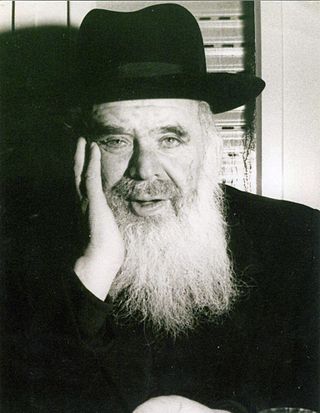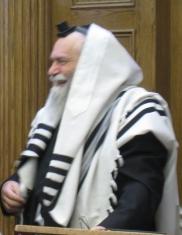
Yitzchak Hutner, also known as Isaac Hutner, was an American Orthodox rabbi and rosh yeshiva (dean).

Aharon Kotler was an Orthodox Jewish rabbi and a prominent leader of Orthodox Judaism in Lithuania and the United States; the latter being where he founded Beth Medrash Govoha in Lakewood Township, New Jersey.

Yeshiva Rabbi Chaim Berlin or Yeshivas Rabbeinu Chaim Berlin is an American Haredi Lithuanian-type boys' and men's yeshiva in Brooklyn, New York. The school's divisions include a preschool, a yeshiva ketana, a mesivta, a college-level beth midrash, and Kollel Gur Aryeh, its post-graduate kollel.

Ner Israel Rabbinical College, also known as NIRC and Ner Yisroel, is a Haredi yeshiva in Pikesville, Maryland. It was founded in 1933 by Rabbi Yaakov Yitzchok Ruderman, a disciple of Rabbi Nosson Tzvi Finkel, dean of the Slabodka yeshiva in Lithuania. Rabbi Aharon Feldman, a disciple of Rabbi Ruderman and a member of the Moetzes Gedolei HaTorah of America, became its head in 2001.

Yaakov Kamenetsky, was a prominent rabbi, rosh yeshiva, posek and Talmudist in the post-World War II American Jewish community.

Mordechai Gifter was an American Haredi rabbi. He was the rosh yeshiva (dean) of the Telz Yeshiva in Cleveland.

Elazar Menachem Man Shach was a Haredi rabbi who headed Lithuanian Orthodox Jews in Israel and around the world from the early 1970s until his death. He served as chair of the Council of Sages and one of three co-deans of the Ponevezh Yeshiva in Bnei Brak, along with Shmuel Rozovsky and Dovid Povarsky. Due to his differences with the Hasidic leadership of the Agudat Yisrael political party, he allied with Ovadia Yosef, with whom he founded the Shas party in 1984. Later, in 1988, Shach criticized Ovadia Yosef, saying that, "Sepharadim are not suitable for leadership positions", and subsequently founded the Degel HaTorah political party representing the Litvaks in the Israeli Knesset.

Chaim Leib Halevi Shmuelevitz, — also spelled Shmulevitz — was a member of the faculty of the Mirrer Yeshiva for more than 40 years, in Poland, Shanghai and Jerusalem, serving as Rosh yeshiva during its sojourn in Shanghai from 1941 to 1947, and again in the Mirrer Yeshiva in Jerusalem from 1965 to 1979. He taught, guided, and inspired thousands of disciples throughout his lifetime, by word and deed, with legendary diligence and intensity in Torah study.

Moetzes Gedolei HaTorah is the supreme rabbinical policy-making council of the Agudat Yisrael and Degel HaTorah movements in Israel; and of Agudath Israel of America in the United States. Members are usually prestigious Roshei Yeshiva or Hasidic rebbes, who are also usually regarded by many Haredi Jews to be the Gedolim ("great/est") sages of Torah Judaism. Before the Holocaust, it was the supreme authority for the World Agudath Israel in Europe.

Aryeh Malkiel Kotler is a Haredi (ultra-Orthodox) rabbi and rosh yeshiva (dean) of Beth Medrash Govoha in Lakewood, New Jersey, one of the largest yeshivas in the world. He is a member of the Moetzes Gedolei HaTorah of Agudath Israel of America.

Rabbi Shlomo Eliyahu Miller is a member of the Moetzes Gedolei HaTorah. He is a Rosh Kollel (dean) and co-founder of the Kollel Avreichim Institute for Advanced Talmud Study, a haredi post-yeshiva educational institution in Toronto and head of its Beis Din. He is a Litvish Haredi Posek in Toronto.
Gadol or godol is used by religious Jews to refer to the most revered rabbis of the generation.

Aaron Moshe Schechter was an American Haredi rabbi. He was the rosh yeshiva (Dean) of Yeshiva Rabbi Chaim Berlin and its post-graduate Talmudical division, Kollel Gur Aryeh. He also served on the presidium of Agudath Israel of America and was a member of that organization's Moetzes Gedolei HaTorah.

Shmuel Kamenetsky is an American Haredi rabbi. He is the co-founder and rosh yeshiva (dean) of the Talmudical Yeshiva of Philadelphia. He is also a member of the Moetzes Gedolei HaTorah.

Shmuel Yaakov Weinberg, known as Yaakov Weinberg was an Orthodox Jewish rabbi, Talmudist, and rosh yeshiva (dean) of Ner Israel Rabbinical College in Baltimore, Maryland, one of the major American non-Hasidic yeshivas. Weinberg was also a rabbinical advisor and board member in Haredi and Orthodox institutions such as Torah Umesorah, Agudath Israel of America and the Association for Jewish Outreach Programs.
Zelik Epstein, also known as Zelig Epstein, was a prominent Orthodox rabbi and rosh yeshiva of Yeshiva Shaar HaTorah-Grodno, a private Talmudical institution in Kew Gardens, Queens, New York, containing a high school, Beis Midrash, and Kollel. Epstein was considered by many to be the last of the Gedolim of his generation.

Yerucham Olshin is an Orthodox rabbi and a member of the Moetzes Gedolei HaTorah. He is one of the four roshei yeshiva (deans) of Beth Medrash Govoha, an Orthodox yeshiva located in Lakewood, New Jersey.
The Talmudical Academy of Baltimore or TA is a K–12 yeshiva founded in 1917. Its present campus, located at 4445 Old Court Road, includes a pre-school building, an elementary school building, a middle school building, a high school building, three gymnasiums, a dormitory, two computer labs, and two study halls which double as prayer sanctuaries.
Avrohom Yitzchok Sorotzkin is a prolific writer and former Rosh Yeshiva of Telshe yeshiva who delivers the most advanced Talmudic lecture at the Mesivta of Lakewood. He is a member of the Moetzes Gedolei HaTorah.














